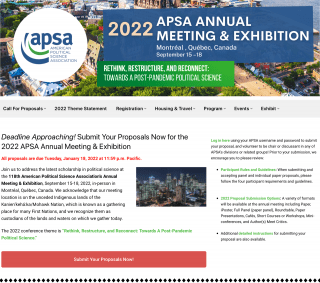In line with this year’s APSA conference theme, “Rethink, Restructure, and Reconnect: Towards A Post-Pandemic Political Science,” the Science, Technology, and Environmental Politics (STEP) division welcomes proposals that can enrich our understanding of policy processes and related political dynamics of various science, technology, and environmental domains and offer the kind of wisdom needed to move into a better society in the post-pandemic era. From public health controversies pertaining to the science and efficacy of coronavirus vaccine development and implementation, to political tensions arising from a restructuring of the political economy sparked by the advancement of artificial intelligence technology, to political conflicts attributed to differences in perception of, and ideal solutions for, the climate crisis, including climate justice for vulnerable populations, there is no doubt that the STEP research agenda will constitute some of the most critical topics for many political scientists in the post-pandemic era. As such, we seek theoretically robust and methodologically innovative proposals that can contribute to societal problem-solving in relevant areas during this time of turbulence. The STEP division respects ontological, epistemological, theoretical, and methodological diversity and recognizes the value of multiplicity and interdisciplinarity in research. We strongly encourage researchers from historically under-represented groups, broadly construed, to submit their proposals. Please submit your proposal by 1/18/2022! For more detail, please see here.
If you want your proposal to be deemed to be part of an APSA theme panel, please consider the following topics:
*concepts of free speech,
*issues on conduct of free speech and professional ethics,
*trends in political science discipline, the profession, or political science education,
*teaching “civic engagement,”
*teaching “divisive concepts” (e.g. critical race theory or other polarizing topics),
*international or US national breaking news (e.g., findings of the Jan. 6 Commission, passing of influential academics and their contributions,” i.e. Charles Mills, bell hooks, Lani Guiner and other prominent figures)
*breaking news or contentious issues in Montréal, Québec, Canada, or elsewhere (e.g., sovereignty, controversial secularism bill, historic language bill, etc.)
